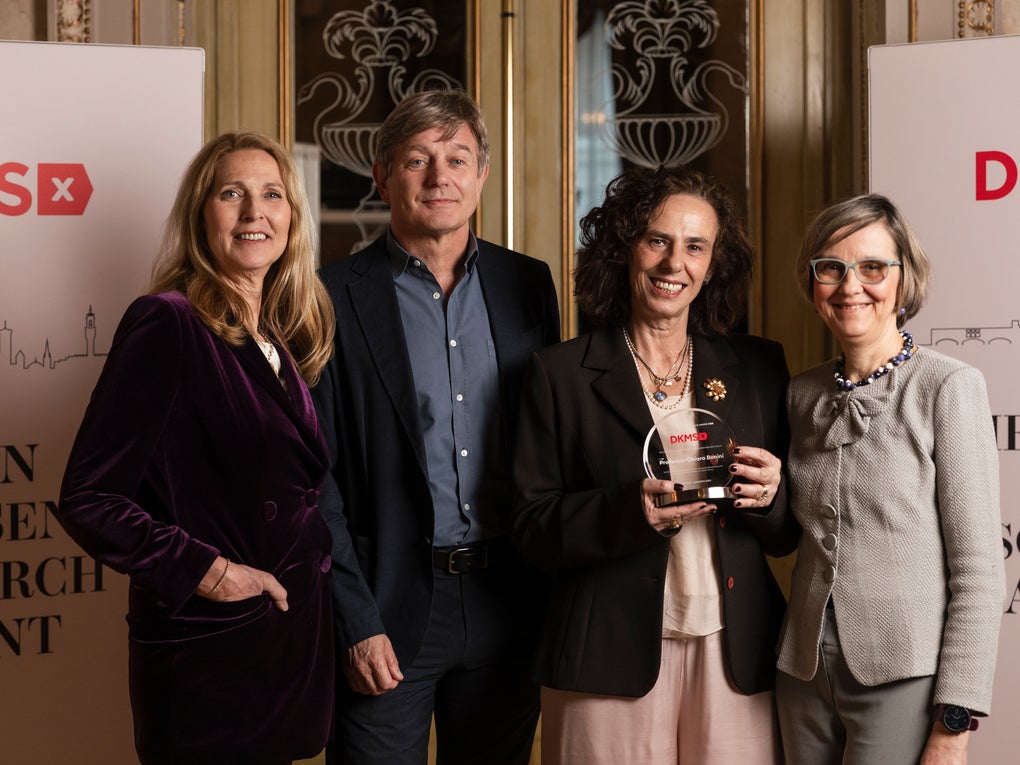
Celebrating Scientific Excellence: DKMS Awards Night in Florence
Professor Chiara Bonini, a pioneer in the clinical application of genetically modified T cells in stem cell transplantation, recieved the DKMS Mechtild Harf Science Award 2025. The award honors the outstanding achievements of internationally renowned physicians and scientists in the field of stem cell transplantation and cellular therapies. "Professor Chiara Bonini’s groundbreaking findings in the field of personalized immunotherapy with genetically modified T cells have been essential in advancing the treatment of blood cancer. These discoveries have led to novel therapeutic approaches hold the potential for translation into treatments for other types of cancer," explains Prof. Dr. Katharina Fleischhauer, member of the DKMS Medical Council and Head of the Institute for Cell Therapy Research at Essen University Hospital, in recognition of this year’s award winner. Chiara Bonini, MD, Professor of Hematology at the University Vita-Salute San Raffaele and Head of the Department of Experimental Hematology at the IRCSS San Raffaele Scientific Institute, Milan, accepted the award on March 31st, 2025, surrounded by physicians and esteemed guests from around the world, at the annual conference of the European Society for Blood and Marrow Transplantation (EBMT) in Florence, Italy. At the ceremony, the highly coveted DKMS John Hansen Research Grant was awarded and the DKMS Special Grant was also allocated for the first time.
"Chiara Bonini is one of the highly renowned scientists worldwide in the field of cell and gene therapy to treat cancer. She has been a leader in the clinical use of genetically modified T cells in stem cell transplantation, laying the foundation for innovative, life-saving therapies" said Prof. Dr. Fleischhauer at the presentation of the DKMS Mechtild Harf Science Award, which comes with 10,000 Euro. "Her work contributed to the development of the first EMA-approved genetically engineered cell-based medicinal product for cancer patients, paving the way for a new era of precision medicine and transformative treatments for patients worldwide."
Award for pioneering personalized immunotherapy with genetically modified T cells
Allogeneic hematopoietic stem cell transplantation (allo-HSCT) remains one of the most effective treatments for patients with hematologic malignancies and can also cure other blood disorders including inborn genetic diseases of the hematopoietic system. Despite its therapeutic potential, there is a risk of acute graft-versus-host disease (GvHD), a significant complication that contributes to both morbidity and mortality. To manage GvHD caused by allogeneic donor T cells, various T-cell-manipulation strategies have been explored. Early approaches focused on suicide gene therapy to balance graft-versus-leukemia effect (GVL) and immune reconstitution while controlling GvHD. Lately, genetic modifications, including tumor-specific T cell receptors (TCRs) or chimeric antigen receptors (CARs), have been introduced to enhance T cell antitumor efficacy.
Through more than 20 years of research in gene and cell therapy, Professor Bonini played a key role in the emergence of this field and advanced one of the first therapy projects applied to HSCT: the suicide gene therapy approach, tends to eliminate alloreactive T cells in case of GvHD, while preserving them in the absence thereof. Her team has since expanded the field of cancer immunotherapy, refining TCR and CAR gene transfer techniques. One of Bonini’s major breakthroughs is TCR gene editing, which permanently reprograms T cells for enhanced precision and persistence in targeting cancer cells. By selecting tumor-specific antigens and engineering T cells to express optimal tumor-targeting receptors, her work has transformed T cell therapies into living drugs, designed to seek and destroy cancer cells with high specificity. "We have the techniques and knowledge for gene editing. The next challenge is identifying the right combinations of TCR and tumor specific antigen that will lead to the most effective therapies," Bonini explains.
Through further research, Bonini and her team were able to transfer this knowledge also to solid tumors: "Our aim is to create a TCR approach that could be utilized to generate TCR-edited cell products for a variety of cancer types. Since progress in cell therapies for solid tumors has been slower, this could be a game changer in this field," says Bonini, who also serves on the executive committees of various scientific societies of cell and gene therapy, hematology and stem cell transplantation including ASGCT, ESGCT, EHA and EBMT.
Research grant supports next-generation scientists

During the ceremony, we announced four outstanding fellows as the recipients of the DKMS John Hansen Research Grant 2025: Gabriele Casirati, MD, PhD (Boston Children's Hospital, Boston, USA), Susan E. De Wolf, MD (Memorial Sloan Kettering Cancer Center, New York, USA), Stephen Persaud, MD, PhD (Washington University School of Medicine, St. Louis, USA), and Abdur Rehman, PhD (The University of Texas MD Anderson Cancer Center, Houston, USA). Their research spans key areas such as T cell and leukemic blast interactions in the regulation of GVL, association of gut microbiome and CAR-T outcomes, and next-generation conditioning regimes with reduced toxicity for HSCT. Find out more about the Awardees here.
"Supporting young medical and scientific talents in blood cancer research is an investment in the advancement of medicine," emphasized Prof. Dr. Marcel van den Brink, Chair of the DKMS Medical Council. With the DKMS John Hansen Research Grant, up to four young scientists are given the opportunity each year to advance their research projects in the field of stem cell transplantation and cell therapy for blood cancer. The grant awards recipients 240,000 Euro over a period of three years. Information on the application process for the DKMS John Hansen Research Grant is available here.
For the first time, we also awarded the DKMS Special Grant, reinforcing our commitment to improve cancer care worldwide. Dr. Brigid McMillan, MBChB (Stellenbosch University, South Africa) committed herself to investigating and describing barriers to specialized hematological care in Southern Africa. This grant aims to support her research on improving cancer care in South Africa and neighboring countries. Find out more about the project here.